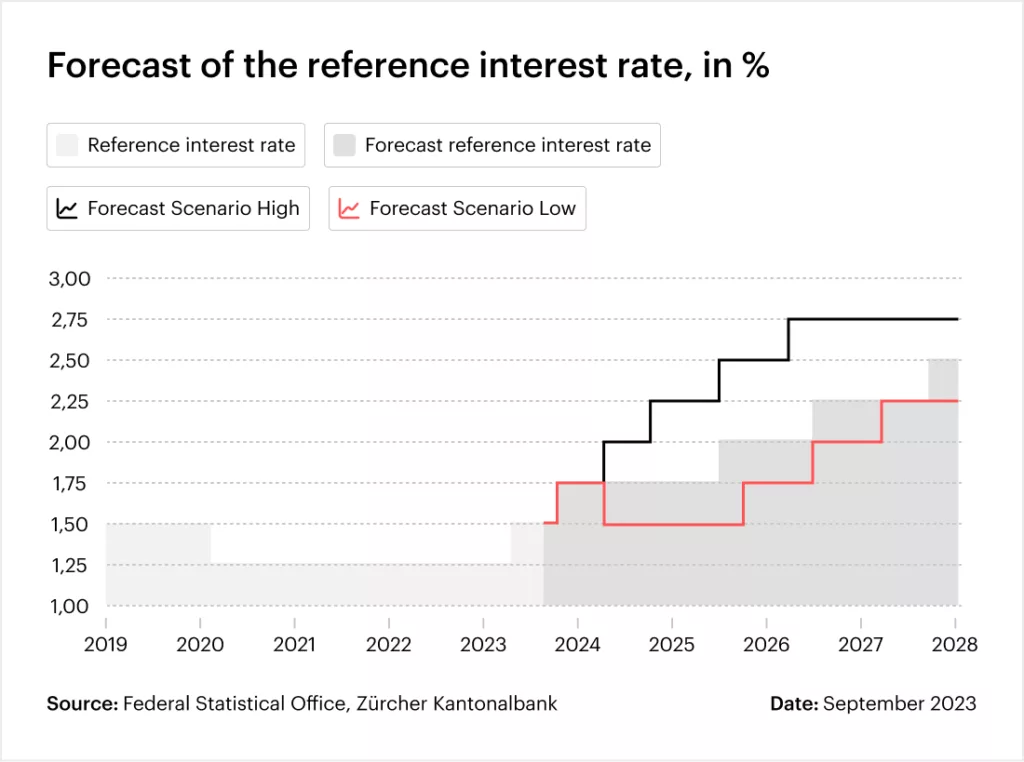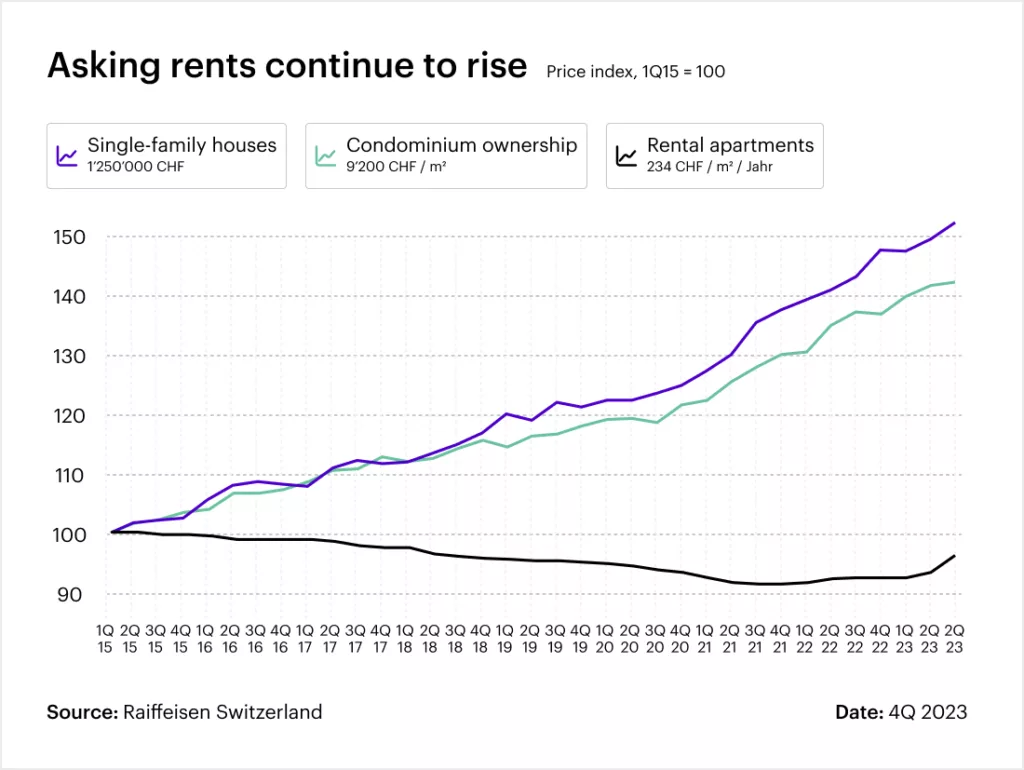In view of the continuing economic momentum, the reference interest rate was raised again today by 0.25% to 1.75% – valid from December 4, 2023. The new increase has potentially far-reaching implications for the real estate market, bringing potential changes in rental costs for all parties and raising important questions for both landlords and tenants. Find out more about the challenges and opportunities that lie ahead.
Table of contents
Toggle
Source: Federal Statistical Office, Zürcher Kantonalbank
Rent increase, what landlords need to consider
The change in the reference interest rate can serve as an impetus to rethink and adjust long-term financial and business plans in order to create a solid basis for the future.
- Get an overall view: When reviewing interest rates, it is advisable to analyze the cost levels, operating costs and energy costs at the same time. In view of inflation, these should be examined further and can be adjusted in parallel with a possible adjustment of the rent. It may be necessary, for example, to adjust the contributions on account or alternatively to introduce a flat-rate service charge based on the payments on account.
- Possible rent adjustments: Landlords are often interested in a balanced solution. The legal framework conditions must be complied with when adjusting the rent. At the same time, social aspects are becoming increasingly important for an overall assessment. In many cases, private owners are more interested in maintaining a positive relationship with their tenants than aiming for higher income – provided this is financially feasible.
- Long-term stability: The recent rise in financing costs and price increases may have led to a deficit. By increasing rents, homeowners can create long-term stability that enables them to plan and carry out maintenance and modernization measures.
- Professional management: The implementation of a rent increase is subject to clear legal criteria. This includes transparent communication of the reasons, the use of officially approved forms and compliance with appropriate deadlines. Cancellations in December are excluded in most cases, so that an increase would not be possible until January 31 or February 1, 2024. Incorrectly submitted adjustments can lead to termination bans of up to two years. Tenants have the right to challenge unjustified increases and thus protect their rights.
Rent adjustments: Yield and social aspects
Although both private landlords and institutional players have the authority to implement rent increases, these two main protagonists do not always pursue identical approaches. In the case of private individuals, the focus is often – depending on the size of the property – on a harmonious relationship with the tenants, to which a higher profit is subordinated. Aspects such as the potential for conflict, bureaucratic hurdles and the willingness of tenants to be accommodating in the event of future problems tend to encourage private individuals to refrain from adjusting rents. In contrast, pension funds, investment funds and companies have a responsibility to generate returns, which means they must insist on rent adjustments.
For tenants: Preparation for possible changes
With the increase in the reference interest rate to 1.50 % in June 2023, some tenants have received corresponding rent changes. This was due to inflation, generally higher costs and the increase in the reference interest rate. If this has already happened, there may be a further increase in the net rent in April 2024 due to the renewed rise in interest rates, provided the owners (have to) make use of this.
Tenants should keep an eye on rising interest rates and plan their financial situation accordingly. It is worth checking the increase carefully, as not every rent increase is permitted. It is important to know that legal protection mechanisms exist that regulate rent increases and ensure that tenants are protected from unjustified costs.
For landlords: Time frame for rent adjustments
Adjusting the rent requires careful planning and compliance with legal requirements. Landlords can only increase the rent if they observe the statutory notice periods, which are generally three months, whereby regional and contractual differences must be taken into account. For comprehensive information on the usual termination dates in various regions of Switzerland, we recommend contacting local experts. In addition, a cooling-off period of ten days must be observed for the announcement of the rent change. This means that notification of a rent adjustment must reach the tenant at least ten days before the start of the notice period. If landlords miss the first possible date for giving notice, the opportunity to adjust the rent is delayed by one month.
Even though the rent has already been increased this year, a further upward adjustment cannot be ruled out.
Forecast and future developments
According to economists, the development of key interest rates, which influence inflation as well as mortgages and the reference interest rate, appears to have peaked – which is why a further rise in the reference interest rate seems rather unlikely. It is assumed that a phase lasting several years will now follow without significant adjustments in either direction. However, a further increase in the reference interest rate to 2.0 percent currently also depends on the medium-term development of mortgage interest rates.
This assessment suggests that a reduction in key interest rates can be expected next year, which in turn should lead to a slight fall in interest rates. A recent study by Raiffeisen Economic Research suggests that owners will probably be able to push through future rent increases without any problems. The rental housing market is increasingly tight with low vacancy rates, which limits the opportunities for tenants to move to cheaper apartments and at the same time favors the enforcement of higher rents.
In addition to these developments, tenants must also expect rising ancillary costs. These costs, which are billed independently of the rent, can place an additional burden on the housing budget. The costs of heating oil, electricity and gas in particular have risen and are being passed on to tenants by landlords. This should be taken into account in financial planning.

Source: Raiffeisen Switzerland
Conclusion
The rent adjustments are due to the increasing housing shortage. Landlords, both private and institutional, are now faced with the task of mastering the associated challenges and opportunities in equal measure. The further increase in the reference interest rate by 0.25 % to 1.75 % has far-reaching effects on the real estate market and rental costs. Landlords need to rethink their long-term plans, while tenants should prepare for possible adjustments. Interest rates continue to rise, and the question of the balance between rent increases and social aspects is becoming more relevant. This is taking place against the backdrop of a persistent housing shortage. A challenging time for everyone involved.
Let the experts guide you. We are at your side for questions and non-binding advice. Arrange a consultation directly or call us on +41 44 244 32 00.
All data are without guarantee. The information on these Internet pages has been carefully researched. Nevertheless, no liability can be assumed for the accuracy of the information provided.












